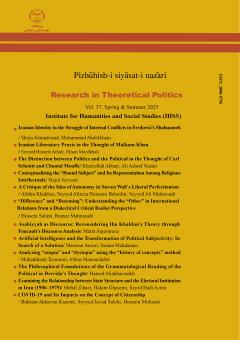هوش مصنوعی و تحول سوبژکتیویته سیاسی: در جستوجوی یک راهحل
الموضوعات : Research in Theoritical Politics
منصور انصاري
1
,
سامان مهدانیان
2
![]()
1 - استادیار گروه اندیشه سیاسی پژوهشکده امام خمینی و انقلاب اسلامی، تهران، ایران
2 - کارشناس علوم کامپیوتر، دانشگاه تهران، تهران، ایران
الکلمات المفتاحية: هوش مصنوعی, حکمرانی الگوریتمی, سوبژکتیویته سیاسی, هانا آرنت, عمل سیاسی.,
ملخص المقالة :
تحول بنیادین فناوریهای هوش مصنوعی در دهههای اخیر، به چالشی هستیشناختی و سیاسی برای مفهوم مدرن «سوژه» و «سوبژکتیویته سیاسی» انجامیده است. این مقاله با طرح این پرسش که «سوژهگی سیاسی انسان در عصر حکمرانی الگوریتمی، چه سرنوشتی خواهد یافت؟» بر آن است تا نسبت میان قدرت الگوریتمی، زوال اراده انسانی و امکان بازسازی کنش سیاسی را واکاوی کند. در پاسخ، دو رویکرد عمده بررسی میشود: نخست، دیدگاهی بدبینانه که پایان سوژهگی انسان را در عصر دادهمحور مفروض میگیرد و دوم، دیدگاهی که امکان بازسازی یا احیای سوژه سیاسی را از خلال رویکردهای فلسفی جدید ممکن میداند. روش تحقیق، تحلیلی- تفسیری با رویکردی بینرشتهای است که مفاهیم فلسفه سیاسی مدرن را با تحولات فناوری معاصر پیوند میزند. یافتههای پژوهش نشان میدهد که بازتعریف سوژهگی، تنها در صورت به رسمیت شناختن حریم شناختی، حق تفکر مستقل و بازسازی میدان گفتوگوی بینالاذهانی ممکن خواهد بود.
انصاری، منصور (1379) هانا آرنت و نقد فلسفه سیاسی، تهران، مرکز.
فوکو، میشل (1380) مراقبت و تنبیه: زایش زندان، ترجمه نیکو سرخوش و افشین جهاندیده، تهران، نشرنی.
--------- (1390) اراده به دانستن، ترجمه نیکو سرخوش و افشین جهاندیده، تهران، نشرنی.
هان، بیونگ چول (1396) فیلسوف فیس¬بوک: درآمدی بر اندیشه بیونگ چول هان، ترجمه علی برزگر، تهران، وب¬سایت ترجمان.
Abensour, M. (2011) Democracy Against the State: Marx and the Machiavellian Movement. Polity Press.
Althusser, L. (1971) Ideology and ideological state apparatuses (Notes towards an investigation). In B. Brewster (Trans.), Lenin and philosophy and other essays (pp. 127–186). New York: Monthly Review Press.
Arendt, H. (1951) The Origins of Totalitarianism. Harcourt Brace.
------------- (1958) The Human Condition. University of Chicago Press.
------------- (1961) Between Past and Future: Eight Exercises in Political Thought. Penguin.
------------- (1978) The Life of the Mind. Harcourt.
------------- (1982) Lectures on Kant’s Political Philosophy. University of Chicago Press.
BarthemeB, F., & Furbach, U. (2023) AlphaZero and Artificial Reason. Springer.
Bostrom, N., & Yudkowsky, E. (2014) The ethics of artificial intelligence. In K. Frankish & W. M. Ramsey (Eds.), The Cambridge Handbook of Artificial Intelligence (pp. 316–334). Cambridge University Press.
Brunnhuber, S. (2024) The Third Culture: The Impact of AI on Knowledge, Society and Consciousness in the 21st Century. Springer Nature Switzerland.
Butler, J. (1990) Gender Trouble: Feminism and the Subversion of Identity. Routledge.
Dennett, D. C. (1992) Consciousness Explained. Boston, MA: Little, Brown and Company.
Dreyfus, H. L. (1972) What Computers Can't Do: A Critique of Artificial Reason. Harper & Row.
Floridi, L. (2013) The Ethics of Information. Oxford University Press.
Foucault, M. (1982) The subject and power. Critical Inquiry, 8(4), 777–795.
Han, B.-C. (2017) Psychopolitics: Neoliberalism and New Technologies of Power. Verso.
------------ (2018) The Expulsion of the Other: Society, Perception and Communication Today. Polity Press.
Hayles, N. Katherine. (2017) Unthought: The Power of the Cognitive Nonconscious. University of Chicago Press.#3 Jorion, P. (2024) L’avènement de la Singularité: L’humain ébranlé par l’intelligence artificielle. Textuel.
Kant, I. (1991) An answer to the question: What is Enlightenment? (H. B. Nisbet, Trans.). In H. Reiss (Ed.), Kant: Political Writings (pp. 54–60). Cambridge University Press. (Original work published 1784).
Kurzweil, R. (1999) The Age of Spiritual Machines: When Computers Exceed Human Intelligence. Viking Press.
--------------- (2005) The Singularity is Near: When Humans Transcend Biology. Viking Press.
Lacan, J. (1966). Écrits. Seuil.
Luger, G. F. (2025) Artificial Intelligence: Principles and Practice. Springer Nature Switzerland.
Minsky, M. (1986) The Society of Mind. Simon & Schuster.
Rouvroy, A. (2013) The end(s) of critique: Data behaviorism versus due process. In M. Hildebrandt & K. de Vries (Eds.), Privacy, Due Process and the Computational Turn (pp. 143–168). Routledge.
-------------- (2016) Algorithmic Governmentality and the End of Critique. Transversal Texts. https://transversal.at.
Rouvroy, A., & Berns, T. (2013) Algorithmic Governmentality and Prospects of Emancipation. Réseaux, 177(1), 163–196. https://doi.org/10.3917/res.177.0163.
Rouvroy, A., & Stiegler, B. (2013) The Digital Regime of Truth: From the Algorithmic Governmentality to a New Rule of Law. La Deleuziana, (1), 319–336.
Searle, J. R. (1980) Minds, brains, and programs. Behavioral and Brain Sciences, 3(3), 417–424. https://doi.org/10.1017/S0140525X00005756.
Taylor, C. (1989) Sources of the Self: The Making of the Modern Identity. Harvard University Press.
Teuscher, C. (Ed.). (2004) Alan Turing: Life and Legacy of a Great Thinker. Springer.
Turing, A. M. (1950) Computing machinery and intelligence. Mind, 59(236), 433–460. https://doi.org/10.1093/mind/LIX.236.433.
Vallor, S. (2016) Technology and the Virtues: A Philosophical Guide to a Future Worth Wanting. Oxford University Press.
Williamson, T. (2007) The Philosophy of Philosophy. Blackwell Publishing.
Zuboff, S. (2019) The Age of Surveillance Capitalism: The Fight for a Human Future at the New Frontier of Power. PublicAffairs.


